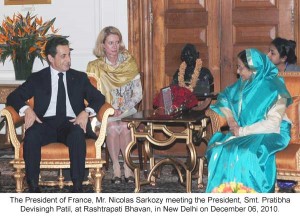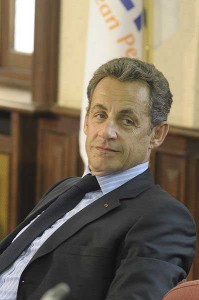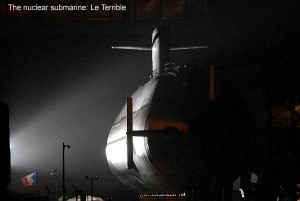People are ‘reproducible’ the Great Helmsman is said to have stated.
That day, Nehru understood that India and China were not brothers, though Mao was at his charming best, when Nehru left Beijing. Diplomat, VV Paranjpe, who was interpreter in the Indian Embassy in Beijing remembered how Mao enthralled his guest. It was probably to ‘balance’ the discussion on the atomic bomb: “My most unforgettable memory of Mao was when he bade goodbye to Pandit Nehru. We were in Zhongnanhai at Mao’s place. It was late in the evening, and the moon had come out. Mao escorted Nehru all the way to his car. While shaking Nehru’s hand, he suddenly came out with two lines from the Chinese classical poet, Qu Yuan. Mao said:
“¦ in February 1960 when France conducted its first nuclear test in Reggane in the Algerian Sahara (it was followed by 209 other tests which ended in 1996 only).
“There is no greater sorrow than the sorrow of departing alive.
There is no greater joy than the joy of first meeting.”
Was this incident on Rajiv’s mind when he presented his plan for total disarmament during the General Assembly of the UN in 1988? We will probably never know.
The Following Years in France
During the following years, under successive presidents du conseil (Prime Ministers)17, new institutions were created for the research, logistic of tests and other aspects of the nuclear defence policy18.
Also read: France & Nuclear Disarmament between vision & realism-I
The arrival of General de Gaulle to power in 1958 greatly boosted the program which became one of the first priorities of the French government. More than anybody else, he had ‘a certain idea’ of the role of France in the world. The nuclear doctrine became known as the ‘force de frappe’ (striking force) or ‘force de dissuasion’ (deterrent force). The idea was that possessing nuclear weapons would be a deterrence, ‘preventing war’ without making it.
“The nation has not forgotten them and will never forget them” “” President Sarkozy speaking about 11 technicians and engineers who were killed in a “˜terrorist attack in Karachi in May 2002.
De Gaulle could probably appreciate India’s policy: to not align itself with any block and not depend on anybody for its defence.
The ‘force de frappe’ took a concrete shape in February 1960 when France conducted its first nuclear test in Reggane in the Algerian Sahara (it was followed by 209 other tests which ended in 1996 only).
De Gaulle wanted France to be independent even from allies, including (or primarily) the United States. However the bomb was clearly aimed at the Soviet Union. In an official note on December 16, 1961, the General fixed the objectives of the ‘force de frappe’: “to inflict on Soviet Union a noticeable reduction (of at least 50 percent) of its economic function”.
The Policy Continues
From the beginning of the Fifth Republic till today, there has been a wide consensus on defence issues in France, particularly on the ‘force de frappe’. Even the Socialists under Mitterrand rallied to the necessity of a policy of deterrence; the Communists, though proponents of total nuclear disarmament did not oppose it.
President Valéry Giscard d’Estaing19 is said to have issued a similar note to the armed forces: “destruction of 40 percent of the economic capacity of Soviet Union and disorganization of the management powers of the country.”
Also read: Indo-French Friendship to Partnership
The world still lived in the midst of the Cold War.
Though new threats appeared, the same doctrine was retained.
 Bruno Tertrais, a French scholar specialized in nuclear matters rightly explains: “the country still sees its nuclear arsenal as an essential element of its security and defense policies. To a large extent, the original rationales for the French nuclear program are still considered valid. From the French point of view, potential strategic threats to European security have not disappeared, and the U.S. guarantee through NATO is not seen as more credible than in the past. …The underlying idea that nuclear weapons make a nation free and independent still exists in the national strategic culture.When it comes to foreign policy, France’s nuclear status seems always to be present in the back of the minds of any president, prime minister, or foreign minister.”
Bruno Tertrais, a French scholar specialized in nuclear matters rightly explains: “the country still sees its nuclear arsenal as an essential element of its security and defense policies. To a large extent, the original rationales for the French nuclear program are still considered valid. From the French point of view, potential strategic threats to European security have not disappeared, and the U.S. guarantee through NATO is not seen as more credible than in the past. …The underlying idea that nuclear weapons make a nation free and independent still exists in the national strategic culture.When it comes to foreign policy, France’s nuclear status seems always to be present in the back of the minds of any president, prime minister, or foreign minister.”
On January 19, 2006, President Jacques Chirac, while visiting the nuclear submarines base in Île-Longue, reiterated the French position: ‘‘In light of the concerns of the present and the uncertainties of the future, nuclear deterrence remains the fundamental guarantee of our security. It also gives us, wherever the pressures may come from, the power to be the masters of our actions, of our policy, of the enduring character of our democratic values.’’
President Jacques Chirac however added an element: the “force de frappe” could be used against the leadership of States that use terrorism against France as well as those that envisage using weapons of mass destruction.
It was an extension of the scope of the ‘force de frappe’.
Further, Chirac added to the vital interests of the French nation, ‘the interests of nations allied to France’, making a first step towards a common European policy in nuclear matters.
A commentator wrote: “French President Jacques Chirac last week announced a shift in the country’s nuclear deterrence doctrine, enlarging the concept of ‘vital interests’ that French nuclear weapons are designed to protect areas potentially far beyond French borders. He also indicated that nuclear arms might be used in more focused attacks and not only for total destruction. He also said France’s ‘force de frappe’ could be used against states that were ‘considering’ deploying weapons of mass destruction.”20
“¦French nuclear weapons are designed to protect areas potentially far beyond French borders.
In a changed world, this was in line with the traditional policy of France. Already in 1994, a White Paper on Defence had expressed reservations about the relevance of ‘conventional deterrence’ as a possible substitute for nuclear weapons.
In his 2006 speech (entirely devoted to the problem of deterrence and nuclear capability), President Chirac described nuclear deterrence as the very foundation of French defense policy: ‘‘[Our] defense policy relies on the certainty that, whatever happens, our vital interests will be protected. That is the role assigned to nuclear deterrence, which is directly in keeping with the continuity of our strategy of prevention. It constitutes its ultimate expression.’’
Paris’ policy remained unchanged, except for minor additions.
The Cherbourg Speech
On March 21, 2008, President Nicolas Sarkozy reiterated the French nuclear doctrine in a speech in Cherbourg at the occasion of the launch of the nuclear submarine Le Terrible. For the first time, a French President dealt at length with the problems of disarmament. He also clarified the French position, which has always been doubtful about the ‘Global Zero’ level advocated by some other countries (particularly President Obama in his Prague speech of April 2009).
 I am quoting from President Sarkozy’s speech:
I am quoting from President Sarkozy’s speech:
- [addressing the technicians, officers and staff of the submarine] Like your predecessors, you may take pride in this submarine — a symbol of France’s high technology and resolve to remain master of its destiny.
- I have come to tell you that maintaining, at the highest level, the capabilities required for deterrence is an objective that is fundamental to our security.
- The nation has not forgotten them and will never forget them. [About the 11 technicians and engineers who were killed in a ‘terrorist’ attack in Karachi in May 2002].
- Thanks to the construction of Europe and the Atlantic Alliance, we have built a Europe of peace. Never in history has our national security been so intimately tied to that of our allies and our European partners. Our common destiny lies with the European Union and beyond that, with all nations that share our values: peace, freedom, fraternity, the defense of the equal and irreducible dignity of human beings regardless of color, creed and origin.
- But peace can never be taken for granted. Mass terrorism has shown us this. Today we are facing the assertiveness of new powers, new ambitions, new threats and thus new rivalries. …In this interdependent world, our interests have no borders, even if they have a geographical location.
- France [should not] prepare for the previous war, as it has done all too often in the past, or to find itself unarmed in the face of a strategic surprise.
- I owe our armies transparency and truth. I owe transparency and truth to the entire French people.
- I have chosen to build the future with a few simple guideposts: our strategy, our ambitions, our alliances, the European objective. And a principle that is simple as well: I absolutely reject the idea of lowering our guard. The defense budget is the State’s second-largest budget. It will remain so.
- The White Paper Commission has acknowledged that the ‘Armed Forces-Model 2015’ was obsolete. Everybody knows it was unrealistic, and yet no one told the French. Well, I am telling them.
- To ensure the French people’s protection, their defense structures must be as operational and efficient as possible. I will draw all conclusions with the maximum degree of realism.
- My first duty as Head of State and Head of the Armed Forces is to ensure that France, its territory, its people and its republican institutions are secure in all circumstances. And that in all circumstances, our national independence and decision-making autonomy are preserved. Nuclear deterrence is the ultimate guarantee of that.
- That is why we are so attached to our nuclear deterrent. It is strictly defensive. The use of nuclear weapons would clearly be conceivable only in extreme circumstances of legitimate defense, a right enshrined in the UN Charter.
- In the framework of nuclear deterrence, it would be possible, in that event, to send a nuclear warning that would underscore our resolve. That would be aimed at reestablishing deterrence.
- As for the Atlantic Alliance, its security is also based on nuclear deterrence. British and French nuclear forces contribute to it. This has been part of NATO’s Strategic Concept since 1974 and it remains relevant today.
- As for Europe, it is a fact: By their very existence, French nuclear forces are a key element in Europe’s security. Any aggressor who might consider challenging it must be mindful of this.
Notes
17. Particularly Edgar Faure and Felix Gaillard.
18. Amongst other things, to construct 2 nuclear submarines.
19. President between 1974 and 1981.
20. Chirac shifts French doctrine for use of nuclear weapons by Ann MacLachlan and Mark Hibbs, Global Research, February 12, 2006.





